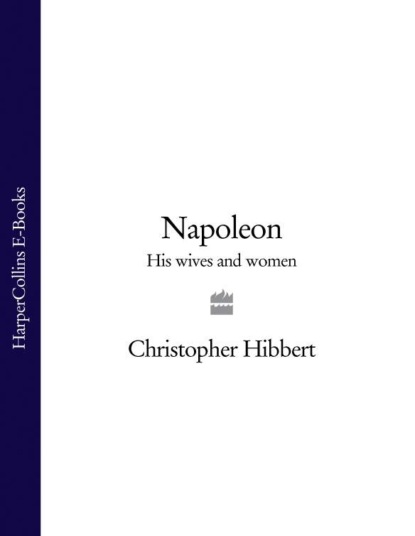По всем вопросам обращайтесь на: info@litportal.ru
(©) 2003-2025.
✖
Napoleon: His Wives and Women
Настройки чтения
Размер шрифта
Высота строк
Поля
Preoccupied with parties, subscription balls, receptions, shopping, fittings at her dressmaker’s, visitors who crowded into her boudoir, and relishing the credit she enjoyed at the most expensive shops as the wife of the brilliant young general, the reception accorded to her at the theatre where audiences stood up to applaud her as she entered her box, the shouts of welcome in the streets, and the cheers of fishwives in Les Halles, Josephine did not find time to read all these letters on the days of their arrival. Occasionally, she would pick one up to read an extract or two to a visitor. Once, she read one to the poet and playwright, Antoine Arnault. In this Napoleon had written of his jealousy of other men who could be with her as he could not, and had added, ‘Beware of Othello’s dagger.’ She laughed and commented, ‘Qu’il est drôle, Bonaparte.’
‘Josephine, no letter from you,’ he complained on 24 May. ‘No news from my good friend…mi dolce amore…Has she forgotten me already?’ Couriers arrived from Paris, but brought no letter from her. He was consumed with anxiety and jealousy. He began to think she must have resumed her liaison with Barras, or perhaps found another lover. He could never bear that, he said, sending ‘a thousand kisses on your eyes, your lips, your tongue, your cunt’. ‘Obviously your pretended love for me was but a caprice.’ Then he relented. ‘Drowning in my sorrow, I may have written too harshly.’
‘I had not believed it was possible to suffer so deeply, so much pain, such awful torment,’ he told her in another letter. ‘I send you a million kisses. Remember there is nothing so strong as my love for you…It will last for ever…The flame that comes from your lips consumes me…My emotions are never moderate…I am in an indescribable state…The ardent love which fills me has, perhaps, unbalanced my mind.’
Frustrated by the few, short letters she sent in reply to his frantic effusions, he sent Andoche Junot to Paris with enemy flags for the Directory and a peremptory order not to return to Italy without his wife. ‘You will come, won’t you?’ he begged her. ‘You must return with Junot, do you hear, my adorable one?’
He sent Colonel Joachim Murat with, similar orders and a fateful question: ‘There’s no one else, is there?’ He later heard with great distress that the big, handsome, buccaneering Murat had boasted of a gross intimacy with Mme Bonaparte, giving ‘barely decent details, fit only for a hussar officers’ mess’. On the day that Murat had arrived in Paris, wearing out numerous post-horses on the way, the glass of the miniature of Josephine which Bonaparte wore on a ribbon around his neck, and which he had shown with such pride to the disapproving major-generals on his arrival in Nice, cracked and shattered. According to his aide-decamp, Auguste Marmont, Bonaparte had turned deadly pale and, giving way to characteristic superstition, had said, ‘Marmont, either my wife is very ill or she is being unfaithful.’
She was being unfaithful.
Captain Hippolyte Charles was a short, lively young man, by no means handsome but attractive, cheerful and amusing, an adept lover, nine years younger than herself. He made her laugh, Josephine said, something quite beyond the ability of Napoleon – whose occasional enforced guffaws were irritating rather than infectious. With his shiny black hair, blue eyes and eager, good-humoured expression, Captain Charles looked very well in his Hussar uniform with its pelisse cast over his shoulder. Men found him a delightful companion; women were entranced by him. Josephine was in love with him.
When Murat delivered Bonaparte’s instructions for her to return to Italy, she told him to tell her husband that she could not undertake so trying a journey: she was too ill; she was pregnant.
When Napoleon received this news, he was about to enter Milan, the capital of Lombardy. His military triumph was complete. He felt, he said, as though the earth were flying beneath him, as though he were being ‘carried to the sky’. Yet, so he told Josephine, he thought of nothing but her illness night and day, ‘without appetite, without sleep, without interest in glory or country’. He ‘longed to see her little tummy’ which must surely give her a ‘wonderfully majestic appearance’.
To Lazare Carnot, the ‘Organizer of Victory’ who had taken to wearing a miniature of Bonaparte beneath his coat as a badge of loyalty, as well as to his brother Joseph and to Barras, Napoleon revealed his agitated concern. Having received a brief note from Josephine to say that she was still ill and that three doctors were in attendance, he told Joseph, ‘I am in despair. Reassure me about my wife’s health. You know that Josephine is the first woman I have ever adored…I love her to distraction. I cannot stay here any longer without her.’ ‘I am in despair,’ he wrote to Barras. ‘My wife won’t come. She must have a lover and that keeps her in Paris.’
The days and weeks passed and still Josephine did not write to him and sent no word that she might come to him. His thoughts turned again to suicide: he wrote of lying for just two hours in her arms and then dying with her. If she were to die he would die himself, ‘a death of despair’.
He spoke of deserting his post and returning to Paris to be with her. ‘My presence,’ he said, ‘will conquer your illness…I have always been able to impose my will upon destiny…Without you I cannot be of any use here…There has never been a love like mine. It will last as long as my life.’
Their general’s threat to abandon his army, just as the Austrians were believed to be preparing a counter-attack, alarmed the Directory to such an extent that Josephine was dispatched forthwith to Milan. She left in tears, so her friend, Antoine Arnault said. ‘She looked as though she were going to a torture chamber.’ Clutching her dog, Fortuné, in his new leather collar, she was accompanied by Andoche Junot and his aide, Hippolyte Charles. Joseph Bonaparte, Désirée Clary’s brother, Nicolas, Josephine’s maid and two menservants also went with her.
Josephine, complaining of the heat and troubled by a persistent headache, was loath to leave Turin on the journey to Milan; and it was with evident reluctance that she entered the neo-classical Serbelloni Palace in Milan, which her husband had filled with flowering shrubs to welcome her. That night was only the third they had spent together.
But ‘what nights’, Napoleon wrote. ‘My happiness is being near you, ma bonne amie…Surely you must have some faults in your character. Tell me.’ She could not share his enthusiasm. ‘I am dying of boredom here,’ she told Thérésia Tallien. ‘My husband does not merely love me. He absolutely worships me. I think he will go mad.’
10 THE SERBELLONI PALACE (#ulink_e08f42b5-0aba-5de4-a95c-4d2db0de0f25)
‘They are so regardless of convention as to dress in clothes
revealing legs and thighs in flesh-coloured tights.’
WHEN NAPOLEON DEPARTED from Milan to his army in the field, his wife evinced no distress. She sent for her friend Fortunée Hamelin to keep her company in the Serbelloni Palace, having borrowed from Mme Hamelin’s husband, the financier, a large sum of money before her departure from Paris; a debt, like so many in the past and future, never to be repaid. Other friends and acquaintances arrived in Milan where their ‘immodest behaviour’, as one newspaper put it, caused some offence. ‘Arms, bosoms, shoulders are all uncovered…Their hair styles are scandalous: their heads are crowned with little military helmets from which tresses of untidy hair escape. They are so regardless of convention as to dress in clothes revealing legs and thighs in flesh-coloured tights.’
As the days passed, Josephine began to enjoy herself, though she missed the diversions and pleasures of Paris and the friends she had left behind there, such as Barras and the Talliens. She was happy to be the centre of attention as the wife of the brilliant young general. She gave parties and dances, and graciously accepted the presents of jewellery and works of art which the heads of great Italian families brought to her in the hope of being spared the looting which Napoleon had specifically condoned. This looting led to the plunder and removal to France from Italian churches, palaces, ransacked cities and towns numerous pictures, sculptures, manuscripts, silver and all manner of other treasures, including – from the Venetian republic alone – the gilded leather hangings from the Doge’s Palace, Veronese’s central panel from the ceiling of the Hall of the Council of Ten in the Doge’s Palace, his Marriage at Cana from the monastery of San Giorgio Maggiore, and the four bronze horses from San Marco which were, for a time, to decorate the Arc du Carousel in the Tuileries. As well as the loss of such treasures, Italians also had cause to complain of French soldiers, officers and men alike, taking such opportunities as had been offered them to enrich themselves. Bonaparte’s family acquired their share and, on behalf of Bonaparte himself, his secretary, Louis de Bourrienne looked after a large coffer filled with gold and silver coins.
Flattered and indulged in the Serbelloni Palace, Josephine complacently accepted letter after passionate letter from her absent husband who assured her that, much as he had adored her in the past, he loved her now ‘a thousand times more than ever’. When he was with her, he wanted ‘it always to be night’ so that he could take her in his arms; he kept ‘remembering her kisses’. Her replies to these effusions were brief but he assured her that they gave him great pleasure, adding what he can scarcely have supposed to be true, that he was certain that she loved writing them.
He was sure that she was better now that her supposed pregnancy had come to nothing; so he hoped that, as soon as she was able to travel, she would join him. So, comforting herself with the thought that Hippolyte Charles was there, she left Milan for Brescia accompanied by Antoine Hamelin. Her journey proved a hazardous undertaking. At Verona, the sudden appearance of Austrian troops obliged them to drive off in great haste for the shores of Lake Garda under an escort of dragoons. Their coach came under fire from a gunboat on the lake; and they had to scramble out to seek the shelter of a ditch along which they crawled towards the carriage which had been driven off to the shelter of a sunken road. For over a week thereafter they drove about Tuscany, eventually arriving in Florence where they found shelter with the Grand Duke Ferdinand III who had signed a treaty with Napoleon. They remained here as guests of the Grand Duke until Pierre Augereau’s victory over the Austrians at Castiglione on 5 August 1796 enabled them to leave Florence and, at last, to reach Brescia.
Napoleon, however, was no longer there. He had gone to a newly established headquarters over twenty-five miles away, having left instructions for his wife to join him. Josephine protested that she was too tired to do so: she would go to bed in the rooms that Napoleon had just vacated and have supper there. She invited Hamelin to join her. When he arrived, Hamelin was surprised to see Hippolyte Charles and the table laid for three. They had supper there together and the two men then left. Some time later Hamelin, remembering that he had left his pistols in the room adjoining that in which they had had their meal, returned to fetch them. Outside the door he was stopped by a sentry who denied him entry.
Upon her return to Milan where her husband, who had given himself three weeks’ leave, had demanded her presence, Josephine was bored. She missed Captain Charles; she missed her friends in Paris; and she missed her children and the stimulating company of Paul Barras. ‘I do love him,’ she told her confidante, Mme Tallien. ‘I am devoted to him.’ It was all very well being fêted by ‘all the Italian princes, and even the Grand Duke of Tuscany’, she said: she would much rather be a private person in France.
Her husband remained ‘all day in admiration’ of her; he treated her as though she were ‘a divinity’; it would be ‘impossible to have a better husband’. There were, however, occasions when it was difficult for her to hide her irritation with his teasing of her, his habit of pinching her so hard it brought the tears to her eyes, his kissing her, fondling her breasts and hugging her so passionately and intimately, even when there were other people in the room, that Hamelin felt constrained to avert his eyes, to walk away and look out of the window as though ‘observing the weather’. Comte André Miot de Melito was equally embarrassed when he accompanied Bonaparte and Josephine on a journey by coach to Lake Maggiore during which, as he delicately put it, Bonaparte was ‘extremely attentive’ to his wife, frequently taking various ‘conjugal liberties’ with her.
The campaign against the Austrians was going badly, and there was even talk of a French withdrawal from Italy. But then came news of Napoleon’s victories, first on 15, 16 and 17 November 1796 at Arcola, then on 14 January 1797 at Rivoli Veronese, which ensured the fall of Mantua after a siege lasting well over six months.
Written in a state of euphoria in the aftermath of these decisive victories, Napoleon’s letters to Josephine became more passionate than ever. He wrote of his impatience to give her proofs of his ‘ardent love’, to be in bed with her, to see again her adorable face, her hair tied up in a scarf à la créole, her ‘little black forest’. ‘I kiss it a thousand times and wait impatiently for the time when I will be in it. To live within Josephine is to live in the Elysian Fields.’
Soon, however, the letters changed their tone. On a visit to Milan, he found that Josephine was not in the Serbelloni Palace. For over a week he waited in vain for her return, writing her a succession of letters by turn angry, self-pitying, mortified and disillusioned. ‘I long to hold you in my arms,’ he wrote. ‘The pain I feel is unbelievable…When I ask you to love me as I love you, I am wrong to do so…I am not worth it…When I am sure that she no longer loves me I will keep silent, wishing only to be useful to her…I will submit to all sorrows, all grief, if only the fates will grant Josephine happiness…Oh, Josephine, Josephine.’
In his grief and discontent Napoleon pursued a policy in Italy quite at odds with the wishes of the Directory in Paris. Having advanced to within sixty miles of Vienna, he signed a preliminary treaty with the Austrians at Leoben, where onlookers were struck by the brusque demeanour of the little man who spoke in strongly accented French, giving orders, making demands and granting few concessions with supreme confidence. Again ignoring the wishes of the Directory and arousing further annoyance in Paris he deposed the Doge in Venice and destroyed that most ancient republic.
Whilst waiting for the details of his Italian diktat to be settled, in May 1797 Napoleon moved his headquarters from Milan to the huge Baroque palace at Mombello. Josephine, who had again been protesting that her poor health demanded her return to Paris, now announced that she would, after all, remain at Mombello, a decision widely assumed to have been taken because Captain Charles’s duties would require his presence there for the whole of that summer.
They were pleasant months for her. She was able to indulge her passion for flowers, which were planted under her direction all over the gardens, as well as her fondness for birds, which fluttered and glided over the waters of the lake and chirrupped in cages ordered for her by her husband. By day, Josephine could be seen strolling in her graceful way down the gravelled paths and across the well-mown grass; by night, she presided over the dining-room table in her white muslin dress, with an ivy wreath in her hair, captivating men by the glances of her eyes, ‘dark blue,’ as one of her admirers described them, ‘always half closed under long lids, fringed by the longest eyelashes in the world’, sipping coffee after dinner on the terrace, her dog by her side.
This was not Fortuné, who had been so impertinent as to bite Napoleon’s leg the first time he shared a bed with the animal’s mistress. For this tiresome animal, to whom Josephine had been so unaccountably attached, had been killed by a dog belonging to the Mombello chef, much to the pleasure of Napoleon who expressed the hope that Fortuné’s replacement – a puppy secretly given to her by Captain Charles – would meet the same fate.
Content as she was to be under the same roof as Charles, even though the opportunities to be alone with him were not frequent, Josephine did not take kindly to the thought of being thrown into the company of several members of her husband’s family whom he now decided to establish at Mombello.
Among the first to arrive on holiday from the Irish college at St Germain, the Dermott Academy, were Josephine’s son, Eugène de Beauharnais, now fifteen years old, and Napoleon’s brother, Jérôme, aged twelve. Also there was Jérôme’s and Napoleon’s mother, Letizia: Napoleon had thought it as well not to inform her of his marriage to the widow Beauharnais until after it had taken place, and Letizia did not approve of it or of her. Although Josephine behaved towards her mother-in-law with the utmost courtesy and that charm of manner that others found so beguiling, Letizia never could bring herself to respond to her wayward daughter-in-law’s natural warmth. Nor could Laure Junot, who wrote of her: ‘Mme Bonaparte was an astonishing woman and must formerly have been very pretty…though no longer in the first bloom of youth.’ Had she but possessed teeth, ‘I do not say pretty teeth but only teeth’, she would have been ‘more attractive than most of her contemporaries’.
Nor could Letizia’s three daughters outgrow their initial wary diffidence in the presence of what seemed to them the assured sophistication of their sister-in-law. Their ill-concealed jealousy soon turned to active dislike.
11 THE FAVOURITE SISTER (#ulink_b0ac64de-04d0-5d61-8044-35c46e6e104b)
‘How could my brother be so cruel as to
send me into exile amongst savages and snakes?’
DISTRACTED AS HE WAS by his passion for Josephine, Napoleon was at the same time deeply concerned by the behaviour of his sister Pauline, who at sixteen, was a sensual, wayward, high-spirited girl, ‘the prettiest and worst-behaved person imaginable,’ in the opinion of the poet, Antoine-Vincent Arnault: ‘She had the deportment of a schoolgirl, chattering away without pause, laughing at nothing and everything, contradicting the most eminent personages, sticking out her tongue at her sister-in-law behind her back, nudging my knee when I wasn’t paying her sufficient attention, and drawing upon herself from time to time the most terrifying looks of reproof from her brother…But, even so, a naturally good-natured child, if without any principle. She was someone capable of doing good from pure caprice.’
Metternich, the Austrian diplomatist and statesman, provided a shorter and less indulgent character sketch. The girl was admittedly ‘as pretty as it is possible to be’, but she was ‘in love with herself and her only occupation was pleasure’.
Pauline had fallen in love with Stanislas Fréron, an unscrupulous, heartless dandy twenty-six years older than herself, a man reputed to be suffering from syphilis and undoubtedly keeping a mistress, an actress, at the Théâtre des Italiens, who had borne two of his children and was shortly to have a third. It had been bad enough, in her mother’s opinion, when Pauline’s brother Lucien – described by Laure Permon as the ‘tall, ill-shaped and very short-sighted Lucien’ – married Catherine, the illiterate and distressingly shy daughter of an innkeeper without informing his mother; but, at least, Catherine was gentle and affectionate. This business of Fréron was much worse.
He had been one of the most outspoken deputies in the National Convention and a leading advocate of the September Massacres. He had been sent with Barras to suppress the counter-revolutionary revolt in the south of France where he had ordered the mass execution of hundreds of opponents of the Jacobin regime. Upon his return to Paris, he had been a leading participant in the conspiracy that engineered the downfall and death of Maximilien Robespierre, and had become a prominent supporter of the anti-Jacobin reaction, as well as a vigorous organizer of the gangs of long-haired jeunesse dorée who paraded intimidatingly through the streets in their outlandish clothes.
When her mother heard of Pauline’s attachment to the devious and dreadful Fréron and of her wish to marry the man – who was admittedly handsome and capable of exercising an undeniably ingratiating charm – Letizia put her foot down: she would not consider it; the girl was a mere child; the proposed marriage was out of the question. Napoleon thought so, too. ‘It is not my intention that she should marry Fréron,’ he told his brother, Joseph. ‘Please arrange the business of Paulette.’ He also wrote to Barras, one of Fréron’s colleagues, telling him to dissuade Fréron from endeavouring to marry ‘a child of sixteen of whom he is old enough to be the father. One does not try to marry when one has two children by a woman still living.’
Her family’s opposition to the match inflamed Pauline’s passion. ‘Ti amo sempre passionatissimamente,’ she wrote to Fréron, ‘per sempre ti amo…ti amo, amo, amo, si amatissimo amante.’
Well aware of the consuming fury of his sister’s passion, Napoleon decided that the girl, susceptible, passionate and ingénue, must be brought to the headquarters of the army in Italy where other more suitable young men would be likely to dampen her burning desire for Fréron, who was later posted to the Army of the North at Napoleon’s suggestion and, later, sent as a sub-prefect to the West Indies where he died within a few months.
A few months after Pauline’s marriage to Fréron had been prevented, Napoleon, while working in his study in the Villa Crivelli at Mombello, was disturbed by the sounds of some sort of activity in energetic process behind a screen. He got up to see what it was and discovered Pauline, now seventeen, in flagrante delicto with one of his young staff officers, Victor-Emmanuel Leclerc. Concerned that his alluring and libidinous sister might well end up in the arms of a man like Fréron, and believing that she might do much worse than settle down with Leclerc, the small but not altogether unpromising twenty-five-year-old son of a well-to-do miller from Pontoise, Napoleon promoted him brigadier-general and, insisting that they get married without delay, arranged for her to be provided with a dowry of forty thousand francs.
Having married Pauline, and proud to have the great General Bonaparte as a brother-in-law, Leclerc took it upon himself to behave as though to the manner born, adopting Napoleon’s way of walking with his hands behind his back and standing, as Jérôme Bonaparte also did, with his right hand tucked across his waist beneath his coat. Absurd as these mannerisms were considered to be, Leclerc was not an absurd man; and when Napoleon decided to send out a force of twenty-six thousand men to Saint-Domingue, the West Indian island now comprising the states of Haiti and the Dominican Republic, to suppress a movement for independence led by Toussaint-Louverture, a former slave of remarkable military talent, General Leclerc was chosen to command it. His wife was by then the mother of a boy named Dermide Louis-Napoleon, Dermide being a name taken from the epic poems which were supposedly by the legendary third-century Gaelic warrior and bard, Ossian, whose works had not long since been translated into French and were so extravagantly admired by Napoleon.
Pauline left France with her husband and young son for Saint-Domingue with the utmost regret, complaining to a friend, ‘How could my brother be so cruel as to send me into exile amongst savages and snakes?’ ‘Besides,’ she added in her hypochondriacal way without too strict a regard for truth, ‘I am very ill. I shall die before I get there.’
She did not die; but she was profoundly unhappy on the island, dabbling in voodooism as a means of relieving her boredom. In the unhealthy tumbledown town of Cap Haïten, she was ill as well as miserable. Her skin turned yellow, she was listless and sick, and her face and beautiful body were covered with sores which had still not cleared up when at length she returned to Paris.
Her husband reported, however, that her behaviour left nothing to be desired: ‘Realizing how dreadful it is for her to remain in a country where she has before her eyes only the sight of the dead and dying, I urged her to return to France, but she refused to do so, saying that she must share my fortunes, good or bad.’









